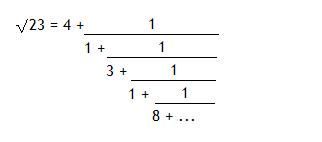连分数及Pell方程的解法
本文代码是我为了解决
Project Euler上的问题而写的数学工具,之前的见:
按字典顺序生成所有的排列
筛法求素数
所谓一个实数的 连分数表示,是指将一个实数x写成以下形式:

其中a0,a1,...,b1,b2,..都是自然数。
当其中b1,b2,..都取为1时,我们称之为 简单连分数表示(Simple Continued Fraction)
可以证明:每一个不是完全平方数的自然数N,其平方根可以写成 简单连分数表示,并且其中a1,a2,..呈周期出现。
比如23的平方根的连分数表示为:

并且其中 [1,3,1,8]就是其一个周期,就是接下来的表示是由[1,3,1,8]循环出现。
下面是得到一个自然数平方根的简单连分数表示的Scala代码:
简单解释一下函数 def continuedFractionOfSqrt(n: Int,buf: Array[Int]):Int的功能:该函数有两个参数,其中n表示要求其平方根连分数表示的自然数n;buf用来保存其连分数表示中a1,a2,...的一个周期(注意,没有包括a0),该参数可以为null。函数返回一个Int,表示a1,a2,..周期的大小,也就是buf中保存数据的长度。
下面是对使用该函数的一个演示:
OK,现在我们可以来看看Project Euler上的 第64题了:
64 How many continued fractions for N ≤ 10000 have an odd period?
题目很简单: 求10000以内的自然数中,平方根的连分数表示的周期长度为奇数的有多少个。
下面是该题的Scala解法(使用了上面的函数):
在将Project Euler66题前,先介绍一个数学名词: 佩尔方程:形如 x^2 - D×y^2 = 1的不定方程称为佩尔方程。其中D为非完全平方数的自然数。并且称其所有正整数解(x,y)中使得x最小的那个解为 最小解。
佩尔方程求解与平方根的连分数表示有着很大的关联,这里我就不细说了,对数学细节干兴趣的可以参考Math World上的 Pell Equation。下面我直接给出 Project Euler66题的叙述及其Scala代码:
就是说对D≤1000,求D使得佩尔方程x^2 - D×y^2 = 1的最小解中x的值最大。
下面上代码:
按字典顺序生成所有的排列
筛法求素数
所谓一个实数的 连分数表示,是指将一个实数x写成以下形式:

其中a0,a1,...,b1,b2,..都是自然数。
当其中b1,b2,..都取为1时,我们称之为 简单连分数表示(Simple Continued Fraction)
可以证明:每一个不是完全平方数的自然数N,其平方根可以写成 简单连分数表示,并且其中a1,a2,..呈周期出现。
比如23的平方根的连分数表示为:

并且其中 [1,3,1,8]就是其一个周期,就是接下来的表示是由[1,3,1,8]循环出现。
下面是得到一个自然数平方根的简单连分数表示的Scala代码:
/**
&#Util.scala
utils for mathematical algorithm,include:
# get all primes below bound in order
# generate all permutations in lexicographical order
# get simple continued fraction representation of the sqrt of n
@author Eastsun
*/
package eastsun.math
object Util {
/**
Get simple continued fraction representation of the sqrt of n
*/
def continuedFractionOfSqrt(n: Int,buf: Array[Int]):Int = {
val sq = Math.sqrt(n)
var (p,q) = (sq,n - sq*sq)
if(q == 0) 0
else{
var idx = 0
var an = 0
do {
an = (sq + p)/q
if(buf != null) buf(idx) = an
idx += 1
p = an*q - p
q = (n - p*p)/q
}while(an != 2*sq)
idx
}
}
}
简单解释一下函数 def continuedFractionOfSqrt(n: Int,buf: Array[Int]):Int的功能:该函数有两个参数,其中n表示要求其平方根连分数表示的自然数n;buf用来保存其连分数表示中a1,a2,...的一个周期(注意,没有包括a0),该参数可以为null。函数返回一个Int,表示a1,a2,..周期的大小,也就是buf中保存数据的长度。
下面是对使用该函数的一个演示:
引用
scala> var buf = new Array[Int](4)
buf: Array[Int] = Array(0, 0, 0, 0)
scala> continuedFractionOfSqrt(23,buf)
res8: Int = 4
scala> buf.mkString(",")
res9: String = 1,3,1,8
scala>
buf: Array[Int] = Array(0, 0, 0, 0)
scala> continuedFractionOfSqrt(23,buf)
res8: Int = 4
scala> buf.mkString(",")
res9: String = 1,3,1,8
scala>
OK,现在我们可以来看看Project Euler上的 第64题了:
引用
64 How many continued fractions for N ≤ 10000 have an odd period?
题目很简单: 求10000以内的自然数中,平方根的连分数表示的周期长度为奇数的有多少个。
下面是该题的Scala解法(使用了上面的函数):
import eastsun.math.Util._
object Euler064 extends Application {
val res = 1.to(10000).filter{ continuedFractionOfSqrt(_,null) % 2 ==1 }.length
println(res)
}
在将Project Euler66题前,先介绍一个数学名词: 佩尔方程:形如 x^2 - D×y^2 = 1的不定方程称为佩尔方程。其中D为非完全平方数的自然数。并且称其所有正整数解(x,y)中使得x最小的那个解为 最小解。
佩尔方程求解与平方根的连分数表示有着很大的关联,这里我就不细说了,对数学细节干兴趣的可以参考Math World上的 Pell Equation。下面我直接给出 Project Euler66题的叙述及其Scala代码:
引用
Find the value of D ≤1000 in minimal solutions of x for which the largest value of x is obtained.
就是说对D≤1000,求D使得佩尔方程x^2 - D×y^2 = 1的最小解中x的值最大。
下面上代码:
import eastsun.math.Util._
object Euler066 extends Application {
val buf = new Array[Int](1000)
var (res,max,d) = (2,3:BigInt,1)
while(d <= 1000){
val pd = continuedFractionOfSqrt(d,buf)
if(pd > 0){
val sq = Math.sqrt(d)
var (x0,y0) = (sq:BigInt,1:BigInt)
var (x1,y1) = ((buf(0)*sq+1):BigInt,buf(0):BigInt)
val cnt = if(pd%2 == 1) 2*pd-1 else pd-1
var idx = 1
while(idx < cnt){
var t = x1
var a = buf(idx%pd)
x1 = x1*a + x0
x0 = t
t = y1
y1 = y1*a + y0
y0 = t
idx += 1
}
if(x1 > max){
max = x1
res = d
}
}
d += 1
}
println(res)
}